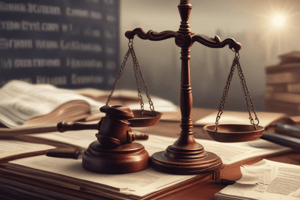Podcast
Questions and Answers
What is the purpose of criminal law in society?
What is the purpose of criminal law in society?
- To protect society from harm and maintain social order (correct)
- To rehabilitate offenders
- To compensate victims of crime
- To punish those who have committed a crime
What is the term for the mental element required to prove a crime?
What is the term for the mental element required to prove a crime?
- Strict liability
- Mens rea (correct)
- Actus reus
- Burden of proof
What is the standard of proof required in a criminal trial?
What is the standard of proof required in a criminal trial?
- Beyond reasonable doubt (correct)
- On the balance of probabilities
- Clear and convincing evidence
- Preponderance of evidence
What is the purpose of the Drug Court?
What is the purpose of the Drug Court?
What is the term for the burden of proving an offence?
What is the term for the burden of proving an offence?
What is the purpose of sentencing in the criminal justice system?
What is the purpose of sentencing in the criminal justice system?
What is the term for the failure to meet the duty of care?
What is the term for the failure to meet the duty of care?
What is the primary purpose of the Competition and Consumer Act 2010 (Cwlth)?
What is the primary purpose of the Competition and Consumer Act 2010 (Cwlth)?
What is an example of misuse of market power under the Competition and Consumer Act 2010 (Cwlth)?
What is an example of misuse of market power under the Competition and Consumer Act 2010 (Cwlth)?
What is resale price maintenance, as defined by the Competition and Consumer Act 2010 (Cwlth)?
What is resale price maintenance, as defined by the Competition and Consumer Act 2010 (Cwlth)?
What is an example of a cartel, as defined by the Competition and Consumer Act 2010 (Cwlth)?
What is an example of a cartel, as defined by the Competition and Consumer Act 2010 (Cwlth)?
What is the purpose of the prohibition on mergers and acquisitions under the Competition and Consumer Act 2010 (Cwlth)?
What is the purpose of the prohibition on mergers and acquisitions under the Competition and Consumer Act 2010 (Cwlth)?
What is an example of misleading behavior, as defined by the Competition and Consumer Act 2010 (Cwlth)?
What is an example of misleading behavior, as defined by the Competition and Consumer Act 2010 (Cwlth)?
What is an example of exclusive dealing, as defined by the Competition and Consumer Act 2010 (Cwlth)?
What is an example of exclusive dealing, as defined by the Competition and Consumer Act 2010 (Cwlth)?
What is the purpose of the Competition and Consumer Act 2010 (Cwlth) in relation to product safety?
What is the purpose of the Competition and Consumer Act 2010 (Cwlth) in relation to product safety?
What type of advertising involves advertising goods or services you cannot supply to get people into your store or online sale?
What type of advertising involves advertising goods or services you cannot supply to get people into your store or online sale?
What is a characteristic of a pyramid scheme?
What is a characteristic of a pyramid scheme?
What is a consequence of engaging in unlawful sales practices?
What is a consequence of engaging in unlawful sales practices?
What is a requirement for businesses when selling products to consumers?
What is a requirement for businesses when selling products to consumers?
What is a key aspect of the 'clear legal title' principle?
What is a key aspect of the 'clear legal title' principle?
What is a requirement for goods purchased from a business?
What is a requirement for goods purchased from a business?
What is a aspect of the 'acceptable recourse' principle?
What is a aspect of the 'acceptable recourse' principle?
What is an example of unlawful sales practices?
What is an example of unlawful sales practices?
Flashcards are hidden until you start studying
Study Notes
Criminal Law and Procedure
Key Concepts
- Actus Reus: The physical act of committing a crime
- Mens Rea: The mental intention or state of mind required to commit a crime
- Causation: The link between the accused's actions and the harm or result
Types of Crimes
- Felony: Serious crimes, punishable by imprisonment (e.g., murder, robbery)
- Misdemeanor: Less serious crimes, punishable by fine or short-term imprisonment (e.g., theft, vandalism)
- Summary Offenses: Minor crimes, tried by a magistrate without a jury (e.g., traffic violations, public disorder)
Criminal Procedure
- Investigation: Gathering evidence and information to build a case
- Arrest: Taking the accused into custody
- Charge: Formal accusation of a crime
- Bail: Release of the accused on condition of appearing in court
- Trial: Presentation of evidence and arguments to a judge and/or jury
- Verdict: Guilty or not guilty decision
Tort Law
Key Concepts
- Damages: Monetary compensation for harm or injury
- Duty of Care: Legal obligation to avoid causing harm to others
- Breach of Duty: Failure to meet the duty of care
- Causation: Link between the breach of duty and the harm or injury
- Remoteness: Limitation on the amount of damages recoverable
Types of Torts
- Intentional Torts: Deliberate actions causing harm (e.g., assault, battery)
- Negligent Torts: Failure to meet the duty of care (e.g., car accidents, medical malpractice)
- Strict Liability Torts: Liability without fault or negligence (e.g., product liability)
Defenses to Torts
- Contributory Negligence: Plaintiff's own negligence contributed to the harm
- Voluntary Assumption of Risk: Plaintiff knowingly accepted the risk of harm
- Exclusion Clauses: Contracts limiting or excluding liability
Criminal Law and Procedure
Key Concepts
- Actus Reus refers to the physical act of committing a crime, which can be an action, omission, or state of affairs
- Mens Rea is the mental intention or state of mind required to commit a crime, which can be intention, recklessness, or negligence
- Causation is the link between the accused's actions and the harm or result, which must be proven in court
Types of Crimes
- Felonies are serious crimes punishable by imprisonment, examples include murder and robbery
- Misdemeanors are less serious crimes punishable by fine or short-term imprisonment, examples include theft and vandalism
- Summary Offenses are minor crimes tried by a magistrate without a jury, examples include traffic violations and public disorder
Criminal Procedure
- Investigation involves gathering evidence and information to build a case against the accused
- Arrest involves taking the accused into custody, which can be with or without a warrant
- Charge is a formal accusation of a crime, which must be read to the accused
- Bail involves releasing the accused on condition of appearing in court, which can be with or without surety
- Trial involves the presentation of evidence and arguments to a judge and/or jury
- Verdict is the guilty or not guilty decision reached by the court
Tort Law
Key Concepts
- Damages are monetary compensation for harm or injury, which can be compensatory or punitive
- Duty of Care is a legal obligation to avoid causing harm to others, which can be owed by individuals or organizations
- Breach of Duty is a failure to meet the duty of care, which can result in harm or injury
- Causation is the link between the breach of duty and the harm or injury, which must be proven in court
- Remoteness is a limitation on the amount of damages recoverable, based on whether the harm was foreseeable
Types of Torts
- Intentional Torts involve deliberate actions causing harm, examples include assault and battery
- Negligent Torts involve a failure to meet the duty of care, examples include car accidents and medical malpractice
- Strict Liability Torts involve liability without fault or negligence, examples include product liability
Defenses to Torts
- Contributory Negligence is a defense where the plaintiff's own negligence contributed to the harm
- Voluntary Assumption of Risk is a defense where the plaintiff knowingly accepted the risk of harm
- Exclusion Clauses are contracts limiting or excluding liability, which can be used as a defense in court
Social Cohesion and Protecting Rights
- Individuals, laws, and the legal system play a crucial role in achieving social cohesion and protecting the rights of individuals.
Principles of Justice
- The principles of justice include fairness, equality, and access.
Characteristics of an Effective Law
- An effective law reflects society's values, is enforceable, known, clear, and understood, and is stable.
Roles of Parliament and Courts
- The parliament and courts have a relationship in law-making, with the parliament creating laws and the courts interpreting them.
Sources of Law
- Common law and statute law are two sources of law.
Victorian Court Hierarchy
- The Victorian court hierarchy includes various levels of courts, with the Supreme Court being the highest.
Types of Law
- There are two main types of law: criminal law and civil law.
Criminal Law
- The purposes of criminal law include punishing, deterring, denouncing, protecting, and rehabilitating.
- Key concepts of criminal law include:
- The elements of a crime: actus reus and mens rea
- Strict liability
- The age of criminal responsibility
- The burden of proof
- The standard of proof
- Types of crime include crimes against the person and crimes against property.
- Summary offences and indictable offences are two types of crimes.
- Possible participants in a crime include principal offenders and accessories.
- Examples of criminal offences include:
- Offence 1:
- Elements of the offence
- Possible defences
- Possible sanctions
- Trends and statistics in relation to the offence in Victoria and another Australian jurisdiction
- Possible impact of the offence on individuals and society
- Offence 2:
- Elements of the offence
- Possible defences
- Possible sanctions
- Trends and statistics in relation to the offence in Victoria and another Australian jurisdiction
- Possible impact of the offence on individuals and society
- Offence 1:
Principles of Justice and the Victorian Criminal Justice System
- The principles of justice include fairness, equality, and access.
- Institutions that enforce criminal law include the police and delegated bodies.
- The balance between institutional powers and individual rights is crucial.
- The Victorian courts have a role in enforcing criminal law.
- The role of the jury in a criminal trial is important.
- Different groups face difficulties in the criminal justice system, including:
- First Nations people
- Young people
- Culturally and linguistically diverse people
- People with mental health issues
- People with disabilities
Sentencing
- The purposes of sanctions include punishment, deterrence, denunciation, protection, and rehabilitation.
- Types of sanctions include fines, community correction orders, and imprisonment.
- Factors considered in sentencing include the severity of the crime, the offender's circumstances, and the impact on the victim.
- Alternative approaches to sentencing include the use of the Drug Court, Koori Courts, and diversion programs.
- Sentencing practices vary in different Australian jurisdictions.
Business Owners' Compliance with Trade Practices Legislation
- Business owners must comply with trade practices legislation, such as the Competition and Consumer Act 2010 (Cwlth), when establishing their business.
Prohibited Business Practices
- Cartels: two or more businesses acting together instead of competing, including price-fixing, bid-rigging, market sharing, and output restrictions.
- Misuse of market power: businesses intending to lessen competition in a market, including damaging/eliminating competitors, preventing competition, or impeding new entrants.
- Exclusive dealing: imposing restrictions on a business's freedom to engage with other competitors.
- Resale price maintenance: controlling prices at which retailers sell products.
- Mergers and acquisitions: limiting competition by substantially reducing competitors in the market.
Undesirable Practices
- Misleading/deceptive conduct
- Unconscionable conduct
- Unfair contract terms
- False/misleading representations
- Bait advertising
- Pyramid schemes
- Referral selling
Misleading Behaviour
- Leading consumers to believe something is true when it isn't
- Offering gifts and prizes in connection with the supply of goods and services and then not providing them
- Providing false information about goods, services, or legal rights
Compliance and Legal Sales Practices
- Consequences of engaging in unlawful practices: heavy fines
- Unlawful sales practices: unsolicited consumer agreements and transparent lay-by agreements
- Regulations governing door-to-door sales and protection of consumer rights
- Importance of providing itemized bills and proof of transactions for consumer clarity
- Clear legal title: companies must legally own the products they sell and transfer full ownership to the consumer after buying
- Corresponding to description: goods purchased must match any description, sample, or demonstration model shown
- Acceptable recourse: goods must be of a quality where they are safe, durable, free from defects, and perform as expected
- Fit for purpose: products must be suitable for the intended purpose stated in instructions or advertisements
- Repairs and spare parts: manufacturers and suppliers must make reasonable efforts to provide repairs or spare parts for their products
- Skilled service: services received from businesses should be performed with reasonable care and skill
- Timely service: services should be completed within a reasonable timeframe
Studying That Suits You
Use AI to generate personalized quizzes and flashcards to suit your learning preferences.




